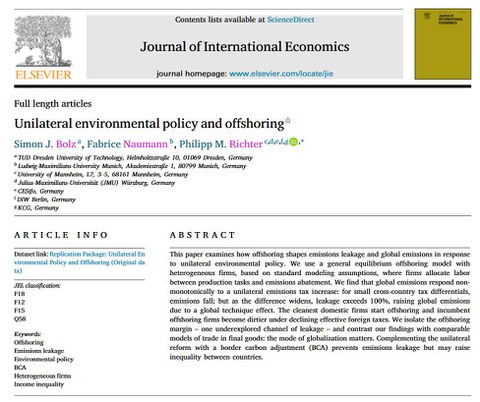Nov 13, 2025
Publication in the Journal of International Economics

Unilateral Environmental Policy and Offshoring
The paper “Unilateral Environmental Policy and Offshoring” has recently been published in the renowned Journal of International Economics.
Authors:
-
Simon J. Bolz – Research Associate and Ph.D. candidate at the Chair of Economic Policy and Economic Research, TUD
-
Dr. Fabrice Naumann – Ludwig Maximilian University of Munich; formerly Ph.D. candidate and Research Associate at the Chair of International Economics, TUD
-
Dr. Philipp M. Richter – University of Würzburg and University of Mannheim; formerly Junior Professor of International Economic Policy, TUD
What is the paper about? The study examines how a unilateral increase in CO₂ taxes in one country affects global emissions, income, and inequality. To analyze this, the authors develop a general equilibrium model with heterogeneous firms and offshoring.
What are the key findings? Under certain conditions, uncoordinated climate policy can backfire – leading to higher global emissions instead of reducing them. This highlights the importance of stronger international coordination between climate and trade policies.
What’s the core story?
A government increases its CO₂ tax to reduce emissions.
Most domestic firms respond by investing more in emission abatement and by cutting back on polluting activities.
However, the most productive – and thus relatively cleanest – firms shift the more emission-intensive parts of their production abroad, to countries with lower CO₂ prices.
Abroad, wages rise as production expands. If foreign CO₂ taxes remain unchanged, emission abatement becomes relatively more expensive than polluting – and offshored production becomes dirtier.
As a result, domestic emissions fall, but foreign emissions rise – a phenomenon known as carbon leakage. If tax differentials are small, global emissions decline overall.
However, when tax differences become large, leakage can exceed 100%, meaning that the policy increases global emissions rather than reducing them.
Introducing a Border Carbon Adjustment (BCA) alongside the CO₂ tax can prevent carbon leakage, but it also increases global inequality and income losses.
Where to read the paper?
Unilateral Environmental Policy and Offshoring
Journal of International Economics (2025), Open Access
